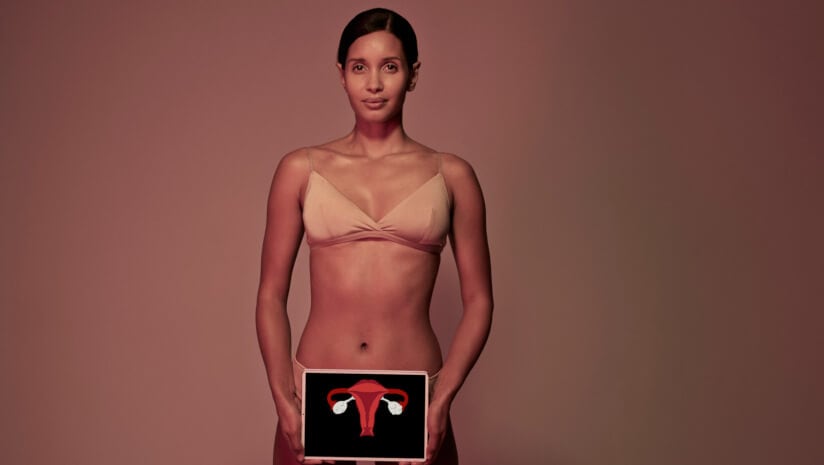So what's driving innovation right now? London-based trends and insights company The Future Laboratory has just shared the findings of its annual Innovation Debrief Report, which paints a helpful picture of new areas to watch for NPD in the beauty and personal care industries.
The research outlines the notable patterns and change-maker brands that are disrupting multiple industries, which are set to define consumer behaviour in the rest of 2024 and beyond.
Here are three trends that are set to impact future innovation…
#Trend 1: ‘Gynaeguity’
Innovations in femtech that cover everything from period pain to fertility are disrupting the women’s health and personal care sector right now.
More women are stepping up to take charge of their sexual health, fertility and gynaecological wellbeing and encouraging others to do the same. This is resulting in younger female consumers in particular looking for a more proactive and personalised approach to feminine health and care.
Deputy creative foresight analyst at The Future Laboratory, Olivia Houghton, said that although women’s health may vary across the globe, one universal truth is that the current system has let them down in the past.
“It’s now time to prioritise the inclusion and comprehension of women, to engage in direct communication with them, and to tailor designs and services to their specific needs in order to provide accurate care,” she stated.
The report highlighted new upcoming businesses such as Béa Fertility, which raised €2.9m to launch its at-home fertility treatment in the UK in July 2023.
The company's Intracervical Insemination (ICI) treatment is a hormone-free alternative to IVF. It claims that the at-home treatment procedure has a 39.28% pregnancy rate over three treatment cycles, and that the offering will make parenthood more accessible for ‘non-conventional’ families.
Meanwhile, US-based startup Sequel has focused on reinventing the tampon – which was much overdo considering that it was created almost one hundred years ago and has remained relatively unchanged since then.
The brand has designed a product with diagonal grooves that spiral downwards and allows the tampon to absorb more fluid, therefore limiting leakage.
#Trend 2: ‘Elastic Luxury’
Despite the popularity of ‘dupes’, many people still want to buy luxury beauty and personal care products if their budgets allow.
That being said, there has been a notable shift whereby the luxury sector is having to adapt to meet changing consumer needs by lending its craftsmanship and solid brand identity to alternative new ventures. One ever-popular example appears to be teaming up with sports events.
The Future Laboratory’s senior foresight analyst Marta Indeka noted that that while growth has slowed for some luxury brands, the cultural influence of wanting aspirational, pricier products is still unharmed.
“Expect luxury brands to further flex their soft power, with sports and entertainment emerging as playgrounds of choice to display creativity, resilience and relevance,” she stated.
One example is LVMH, which has been establishing itself as a leading benefactor of sports and the arts over the past year.
In July 2023, LVMH announced its sponsorship of the Paris 2024 Olympic and Paralympic Games and over the past few months, its all-star beauty retailer Sephora has been hosting activations for the public.
Chairman and CEO of LVMH, Bernard Arnault, was even publicly quoted saying: “Sports are a tremendous source of inspiration for our Maisons, which will unite creative excellence and athletic performance.”
According to The Future Laboratory’s research, bold activations in these lesser-expected areas (such as a crossover between beauty and fashion with sports) are “becoming a status symbol for large brands.”
It also highlighted the growing number of beauty companies teaming up with haute couture fashion houses, stating that “as the luxury fragrance market becomes an increasingly saturated space, luxury brands will look to standout through exclusivity initiatives, such as fragrance collections only accessible to ultra-loyal customers.”
One recent example is French multinational L’Oréal’s partnership with the Italian fashion house Prada, which is now expanding to create, develop and distribute luxury beauty products for the Miu Miu. Its fragrances are expected to launch in 2025.

#Trend 3: ‘Biophilic bonds’
In a response to a tech-dominated world, more consumers are seeking to connect with nature and therefore, more beauty and personal care brands are tapping into this need by infusing biophilic elements into their designs and experiences.
The Future Laboratory art director, Savannah Scott, shared that: “The new currency for brands is nature and authenticity. Modern consumers, especially Generation Z, are seeking brands that not only embody their values but also support their lifestyles too.”
“She added that “we’ve seen a rise in technological fatigue” and said that “consumers are now seeking the simplicity and wonder that can be found in the natural world, preferring experiences that evoke these feelings over automated convenience.”
One example it highlights is scent brand Future Society, which uses DNA sequencing to recreate the scent molecules produced by extinct flowers.
Meanwhile the luxury Spanish fashion house Loewe has filled a traditional Victorian greenhouse with its botanical fragrances and taken it on an immersive road trip around Spain, where customers could experience its fragrances surrounded by the leafy vegetation that inspired them.
The Future Laboratory pointed out that as fragrance continues to emerge as one of the strongest beauty categories, more scent brands should consider hosting immersive popups that allow customers to experience the scents before purchase.





